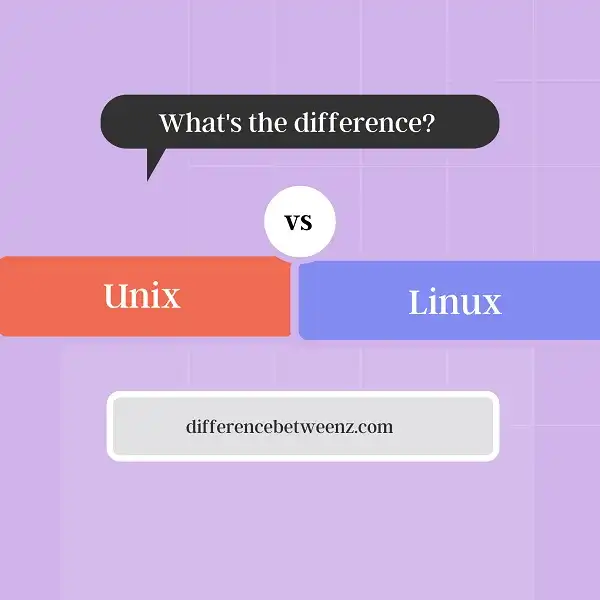Unix and Linux are two different types of operating systems. Unix is a proprietary system that was developed in the 1960s by Bell Labs. Linux, on the other hand, is an open-source system that was created in 1991 by Linus Torvalds. While both systems have their similarities, there are also some key differences between them.
What is Unix?
Unix is a computer operating system that was developed in the 1960s at AT&T’s Bell Laboratories. It is a multitasking, multi-user system that supports a wide range of software applications. Unix is known for its stability and reliability, as well as its ability to handle a large number of concurrent users. Its flexibility and portability have made it a popular choice for use on servers, workstations, and embedded systems. Today, there are many different versions of Unix available, including AIX, Solaris, HP-UX, and macOS.
What is Linux?
Linux is a Unix-like computer operating system assembled under the model of free and open-source software development and distribution. The defining component of any Linux system is the Linux kernel, an operating system kernel first released on September 17, 1991, by Linus Torvalds. Linux was originally developed as a free alternative to Microsoft Windows and has since grown to be one of the most widely used operating systems in the world. Today, Linux is used on everything from personal computers and servers to mobile devices and embedded systems.
While the Linux kernel is licensed under the GNU General Public License (GPL), many of the components that make up a typical Linux distribution are released under a variety of other open-source licenses. As a result, Linux distributions can be tailored to meet the specific needs of users, making it an incredibly versatile platform.
Whether you’re looking for a powerful server platform or a simple desktop operating system, Linux has you covered. Thanks to its open-source nature, there’s a wide range of software available for Linux, and it’s easy to find support when you need it.
Difference between Unix and Linux
- Unix is a multitasking and multi-user operating system that was developed in the 1960s. It is widely used in servers, workstations, and mainframes. Linux is an open-source operating system that was developed in the 1990s. It is widely used in desktop computers, servers, and embedded systems. Both Unix and Linux are based on the Unix philosophy of “small, simple, modular programs that work together to perform complex tasks.” Both Unix and Linux are also capable of running on a variety of hardware platforms.
- However, there are some key differences between Unix and Linux. First, Unix is a proprietary operating system, while Linux is open source. Second, Unix is typically used in commercial environments, while Linux is often used in non-commercial environments such as personal computers or scientific research. Finally, Unix has a reputation for being more stable and reliable than Linux, although this may vary depending on the particular implementation of each operating system.
Conclusion
Unix and Linux are both operating systems that use a command-line interface. However, there are several key differences between the two. For example, Unix is designed for single-user operation while Linux can be used by multiple users simultaneously. Additionally, Unix is more expensive than Linux and may require more technical expertise to operate. Ultimately, the choice of which operating system to use depends on your specific needs and preferences.


